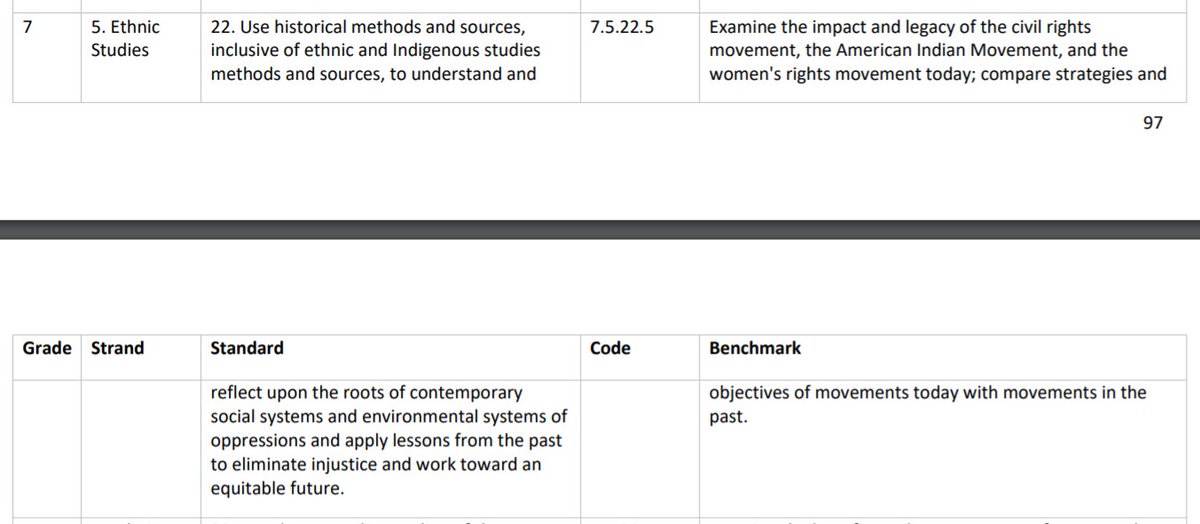
I've been asked a lot lately if CRT is being used in classrooms currently, if it's being written into the standards, why standards are being rewritten at all, etc.
I've also been asked why I believe it is important to have additional culturally/racially inclusive perspectives.
I've also been asked why I believe it is important to have additional culturally/racially inclusive perspectives.
Minn. Stat. § 120B. 021 Subd. 4(f) states:
The commissioner must implement a review of the academic standards and related benchmarks in social studies beginning in the 2020-2021 school year and every ten years thereafter.
That's why a review is occuring - not a political move.
The commissioner must implement a review of the academic standards and related benchmarks in social studies beginning in the 2020-2021 school year and every ten years thereafter.
That's why a review is occuring - not a political move.
1st & foremost, it's important 4 people 2 define what CRT is. Most people on Twitter/FB or in real life struggle to do it (educators, conservatives, liberals, people in-between, etc.), &/or have come up w/some sort of bastardized version that picks/chooses only elements of it.
So again, why is it important to have culturally/racially inclusive perspectives in our standards?
My simplest argument would be;
My simplest argument would be;
The history of the United States has been heroic and horrific. It has been torturous, traitorous, tremendous and terrific. It has seen highs and lows, and will continue to. Studying more aspects about history is not rewriting history. It is learning.
Including historic context from often times oppressed, marginalized and absent narratives help us to better understand the complexities of an historic event, era, etc. That doesn't mean we eliminate things completely. It means we analyze, research and reflect more WITH more.
To me, this isn't Critical Race Theory, & wouldn't fit the def. from nearly 40 years ago through today. Rather, it's what historians should be striving to do - study a more diverse collection of histories to better understand our world around us today & societies from the past.
With that said, revisions of social studies standards (which are required every 10 years in Minnesota by state statute) provides the perfect opportunity for individuals to question the process, the intent, etc.
While this too, can be a very good thing, the messaging can easily be co-opted into a different conversation completely to meet the needs of selective interpretations.
We've all seen misrepresentations of the process, the law & what has/hasn't been in the ss standards the past decade + (by state statute or individual school districts). W/the echo chambers of social media, it often serves to enhance the misperceptions with minimal clarification.
Now, there are numerous flaws w/the way the proposed revisions currently exist and I hope that the revision committee will address those things moving forward... just as there have been flaws w/the current standards and those before that.
That's a whole thread in and of itself.
That's a whole thread in and of itself.
For example, why are indigenous viewpoints being considered more in the current proposals for the Minnesota social studies standards? I think that is a fair question. There are a couple of potential responses;
Pick up a history textbook from the 1900s, 1930s, 1950s, 1970s, 1990s or even early 2000s and see how indigenous people and nations are described... if they are even described in the textbooks at all. I did on study on this when I was at the University of Minnesota.
There is also this:
Minn. Stat. § 120B. 021 Subd. 4(a): The commissioner must include the contributions of Minnesota American Indian tribes and communities as related to the academic standards during the review and revision of the required academic standards.
Minn. Stat. § 120B. 021 Subd. 4(a): The commissioner must include the contributions of Minnesota American Indian tribes and communities as related to the academic standards during the review and revision of the required academic standards.
Does it feel to me that the standards review committee throws a comment into a benchmark, sort of as an afterthought or qualifier at times? Yes, I believe so, & it makes 1 question why THOSE voices & not others. Could this be better served as an example, rather than a benchmark?
Could several of the 6th grade Minnesota Studies standards & benchmarks, especially in regards to the fur trade era be rewritten, and or combined in different ways? Certainly.
W/that said, you might hear the term "grain size" while listening to discussions about standards.
W/that said, you might hear the term "grain size" while listening to discussions about standards.
Grain size refers to the amount & level in which the subject matter is being described. Is it something that should be done in this grade level or higher? Are there too many objectives in this benchmark that could be spread out? Should things be combined & increase grainsize?
Again, I would agree that these discussions should be taking place.
I'm not sure if anyone noticed, but women are only mentioned four times in the social studies revision at this point. You heard that correct. 4. All of them appear in the form of a benchmark.
7.5.22.5
8.4.21.2
9.4.18.14US8
9.4.19.9US3



7.5.22.5
8.4.21.2
9.4.18.14US8
9.4.19.9US3




Can women be talked about at other times throughout the standards. Certainly. With that said, we need to be intentional when we rewrite the standards to have that level of inclusiveness be more obvious.
Today is the 101st anniversary of the 19th amendment, btw.
Today is the 101st anniversary of the 19th amendment, btw.
I've already tweeted several threads, dating back to February, regarding the misinformation that has surrounded the Minnesota standards review. If you are interested, you can check out this
Thread from February 16, 2021 -
Thread from February 16, 2021 -
https://twitter.com/MarkJWestpfahl/status/1361804711331061761
To see how misinformation can be spread and how quickly it can get to groups in print and via social media channels, check out this thread from April 25, 2021.
https://twitter.com/MarkJWestpfahl/status/1386373671011319814
This is a shorter thread from June 16 that highlights how the same purposeful misleading and misinformation gets continually echoed.
https://twitter.com/MarkJWestpfahl/status/1405255888026357762
It's not just special interest groups that are repeating misinformation about social studies and educators, it happens and is amplified by our elected leaders. I'm still waiting to hear of @paulgazelka would like to meet.
This is from August 11, 2021.
This is from August 11, 2021.
https://twitter.com/MarkJWestpfahl/status/1425501137977884675
I haven't heard back from @sendahms either. I'd still love to have a sit down meeting w/him to discuss his concerns, thoughts, & ideas for how to move forward. #mnleg
It's been half a year since this came out.
facebook.com/watch/?v=33056…
Here's a bit more:
It's been half a year since this came out.
facebook.com/watch/?v=33056…
Here's a bit more:
https://twitter.com/MarkJWestpfahl/status/1361804711331061761?s=19&fbclid=IwAR30i4yruQYNrVfV3IAVV08ODWjoz0ynDlbU029b46VMcNPLaZ_MijdqpMk
• • •
Missing some Tweet in this thread? You can try to
force a refresh









